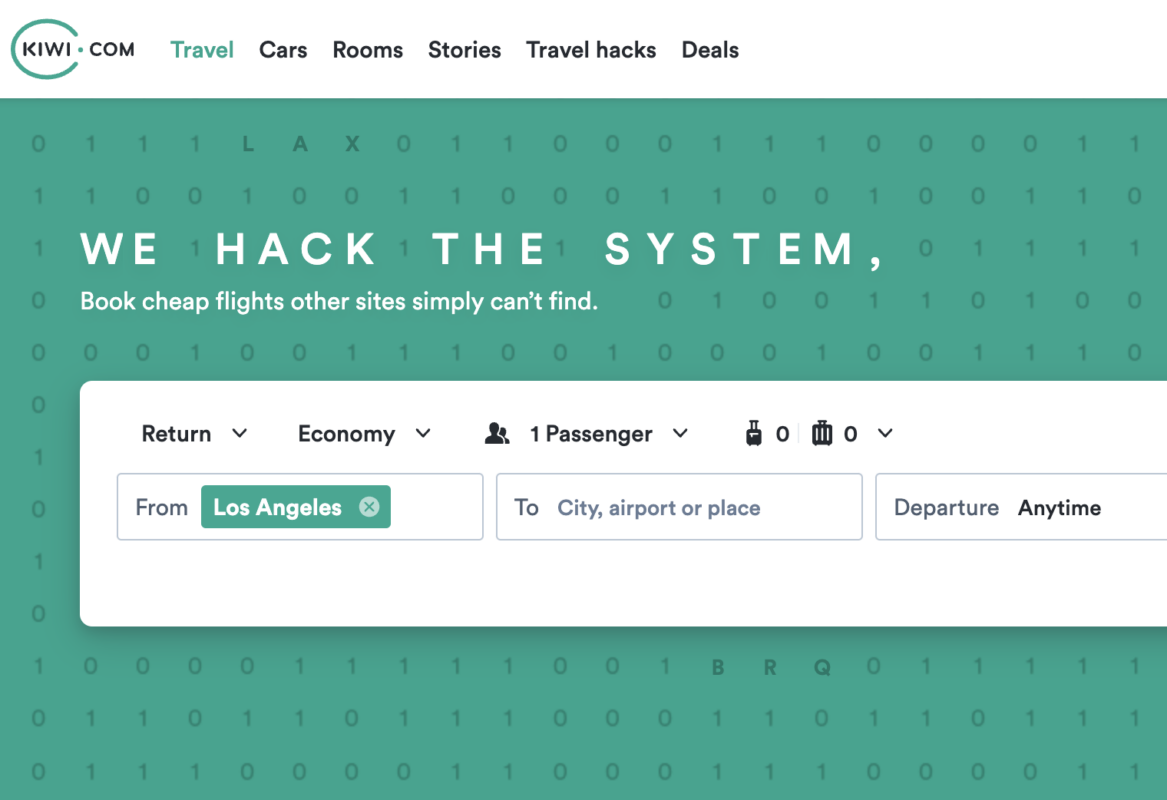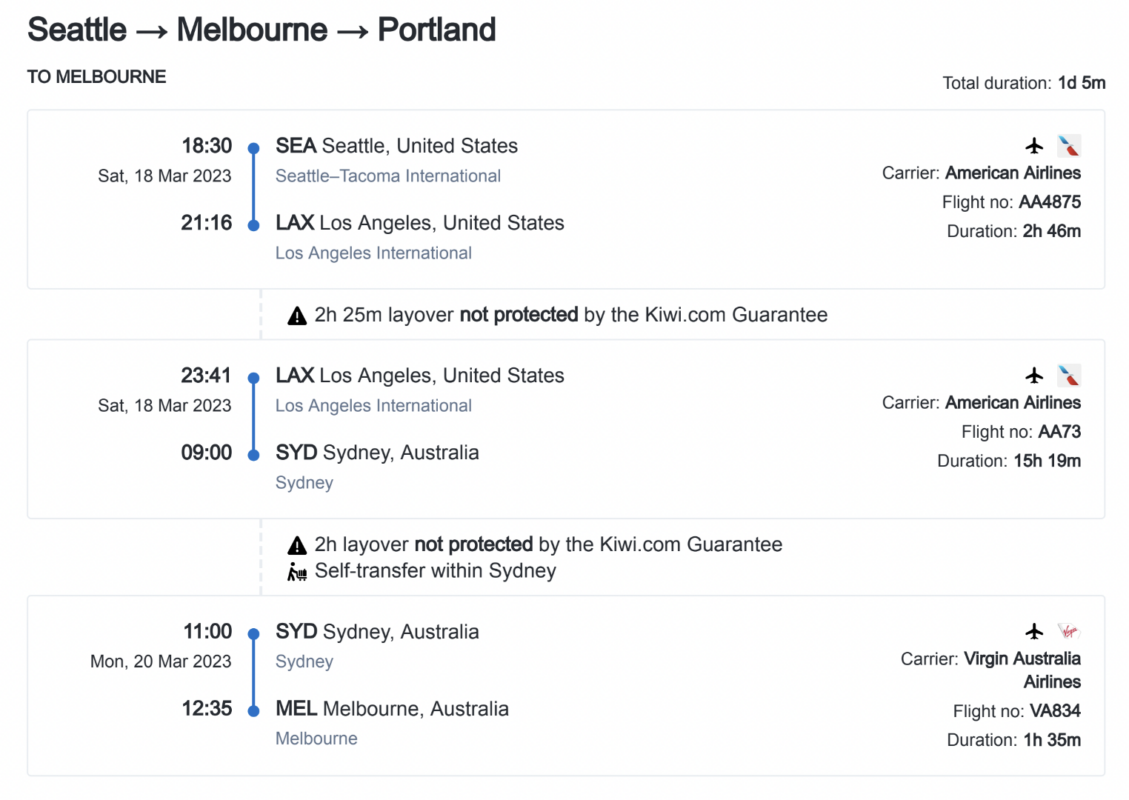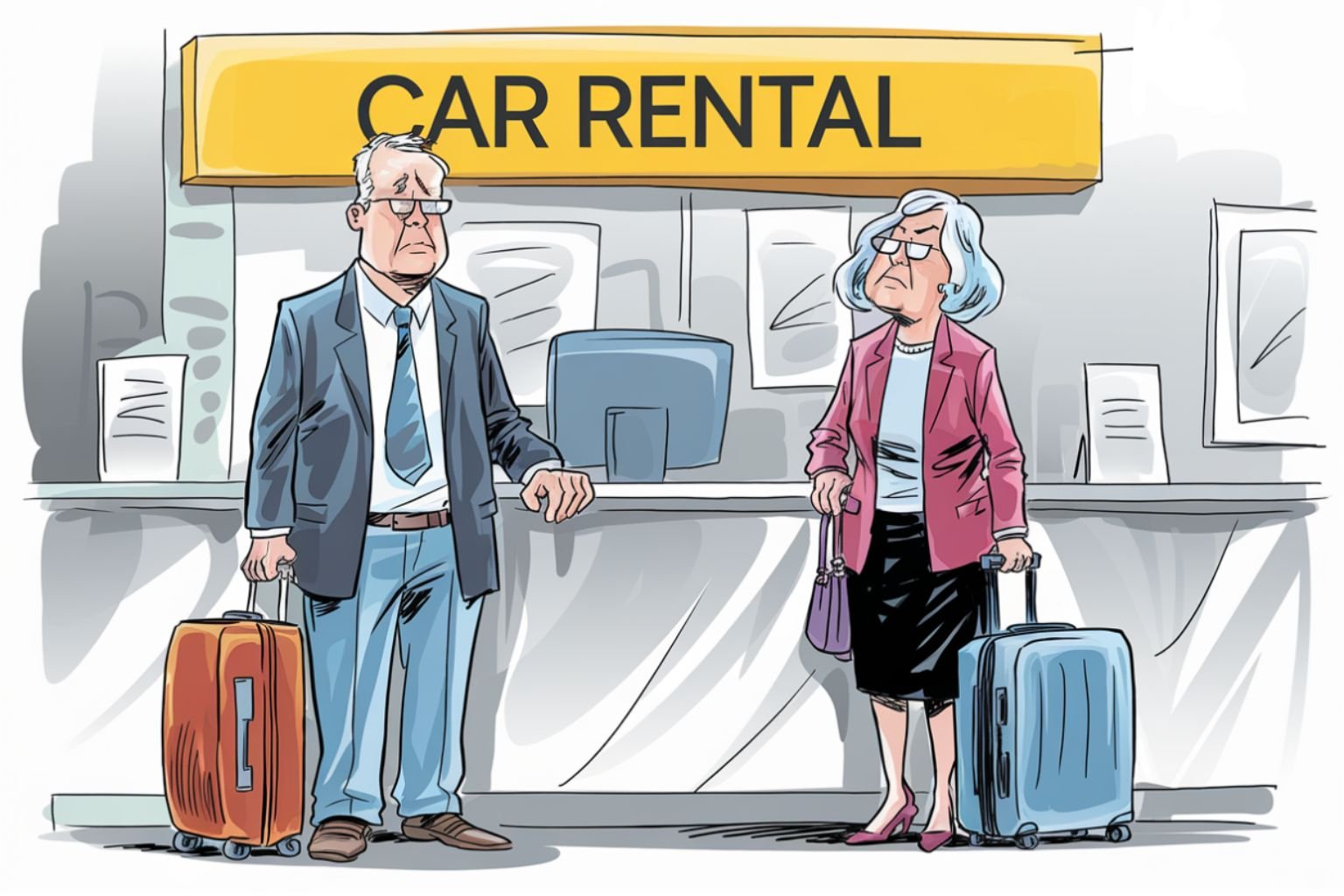Kiwi.com is a travel site that claims to “hack the system” by finding the cheapest flights. But for Chandramouli Kashyap, who booked three round-trip tickets to Melbourne, Australia, through Kiwi.com, the system hacked him.
He discovered that his reservation was not for Melbourne, but for Jakarta, Indonesia. How did that happen — and what are his rights?
Kashyap says he’s the victim of a travel scam.
“I hope you alert your readers to this,” he says.
Oh, I will. But first things first.
- What is Kiwi.com and how does it work?
- How do you avoid a travel scam when you’re booking a flight?
- What are your rights when you hack a flight and are denied boarding?
Kashyap’s story serves as a warning to anyone who wants to save money on a flight. Be careful — very careful — when you see an attractive airfare. You might be breaking the rules.
How did he end up with a flight to Jakarta?
Kashyap wanted to fly from Portland, Oregon, to Melbourne with his two daughters for his father-in-law’s 80th birthday. That’s a long haul, and an expensive one at that. The average round trip flight is around $1,500 in economy class (which is something I wouldn’t wish on my worst enemy).
Like any self-respecting air traveler, he was looking for ways to save money. So he clicked on Kayak.com, a metasearch site that scours several online sites for the best possible deal.
And that’s how he got to Kiwi.com.
He found a ticket from Seattle to Melbourne via Sydney on American Airlines, with a return from Melbourne to Portland via Honolulu on Jetstar and Hawaiian.
“When I checked into American Airlines at Seattle airport, the agent informed me that the reservation showed we were going to Jakarta via Sydney and not Melbourne,” he recalls. “Alarmed, I showed her my travel itinerary, which showed our travel to Melbourne, Australia, and back with Kiwi.
Or did it?
“You purchased a hacker fare”
The American Airlines agent was adamant that he and his daughters were flying to Jakarta. So Kashyap called Kiwi.com to get the truth.
After a long wait, a Kiwi.com agent finally answered and revealed that the American Airlines agent was correct.
“He said I had purchased a hacker fare, which meant I was supposed to get off the plane in Sydney and not continue to Jakarta,” he says. “He further admonished me that I should not have disclosed to the agent that I am going to Melbourne. Instead, I should have pretended to go to Jakarta and surreptitiously get off the plane in Sydney without making the connection to Jakarta.”
Kashyap says he was stunned.
“It looked suspicious and illegal,” he says.
What is a hacker fare?
A hacker fare is a ticket that may save you money but also violates airline policy. For example:
- Throwaway tickets. Because business travelers have more money to spend, airlines will often charge more for one-way tickets. If you want to save money, you can buy a roundtrip ticket and simply discard the return portion.
- Hidden City tickets (skiplagging). You can also save money by purchasing a ticket where you plan to disembark at a connection rather than continuing on to your final destination. Airlines may offer a deal on flying to the final destination, but the fare to your connecting city may be higher.
- Back-to-back tickets. Tickets booked for weekday travel may cost more than those that include a Saturday night stay — again, because those are the tickets business travelers prefer. By reserving two consecutive round-trip tickets that coincide with a midweek itinerary and only using half of each ticket, you might save money.
Airlines view these ticketing strategies as illegal because they violate their ticket contract. But technically speaking, they do not break any laws.
Kashyap had a hidden city itinerary — and he was not happy about it.

His travel site hacked the system, but can he unhack it?
Determined to do the right thing, Kashyap returned to the American Airlines ticket counter and explained the situation.
“I asked the agent to issue me the boarding pass only to Sydney and void my Sydney-Jakarta section,” he says. “I even offered to pay the change fee.”
No can do, said the agent. Only Kiwi.com could alter the reservation.
His only choice: Buy new one-way tickets from Seattle to Melbourne on another airline, leaving the next day.
“I had to spend an extra night in Seattle, paying for hotel and cab,” he recalls. “My kids were traumatized by this experience, as was I. What was supposed to be a joyous occasion for us turned into a nightmare.”
Kashyap is furious. He wants Kiwi.com to reimburse him for the airfares, plus the money he had to spend on hotels and new tickets.
“And I don’t even know how to attach a dollar value for emotional toll and the missing out on some events due to our late arrival,” he says. “I want the money refunded to the card I used to pay for travel.”
But will he get that?

What is Kiwi.com and how does it work?
Kiwi.com is a travel search engine that promises to help you find and book cheap flights other sites can’t find. It uses a concept called “virtual interlining” to combine itineraries from over 750 carriers, including many that do not usually cooperate in online bookings. (Kiwi.com says “virtual interlining” uses a computer algorithm to search for the best combination of flights and airlines to get you to your destination at the lowest possible price.)
But Kiwi.com’s biggest money-saving hack is helping users book a hidden city ticket.
Why would anyone book a ticket like that? Because airlines price their tickets according to demand rather than logic. So, for example, if you want to fly from Washington to London, you might find a less expensive fare from Washington to Brussels with a connection in London. You can just get off the plane in London and miss the last leg of your flight.
Note: Airlines don’t allow hidden city ticketing. If they catch you, they could charge you the fare difference, confiscate your frequent flier miles or even ban you. And don’t even try to check luggage on a hidden city flight, because it will end up at the final destination.

How do you avoid a travel scam when you’re booking a flight?
Travel scams are sometimes difficult to spot when you’re booking an airline ticket on a third-party site. The reason, as I mentioned before, is that there’s no logic to the way airlines price their tickets. You could find a legitimate fare for only a few dollars — or a fraudulent fare that costs thousands.
Here are a few strategies for avoiding a scam.
Don’t fall for an unsolicited email
Scammers often use phishing tactics to trick you into revealing personal information or clicking on malicious links. Avoid responding to unsolicited emails with an “amazing” airfare offer.
Beware of “too good to be true” airfares
If a ticket price seems suspiciously low, it might be a scam. Conduct thorough research before committing to a bargain. Hidden city ticketing, while not illegal, may violate airline terms of service and could result in additional charges or cancellation of your ticket.
Book directly with a reputable airline or travel advisor
You’re far less likely to get scammed by clicking on an airline website (it’s still possible, although it’s very unlikely). It really depends on the airline. If you’re dealing with a large, well-known air carrier, you’re as close to safe as you’re going to get. If it’s a fly-by-night operation, perhaps not. Same thing goes for travel advisors. Here’s how to find a reputable travel agent.
Verify the site’s authenticity
Before entering any personal or financial information, check out the address. Is it the real thing? Make sure it matches the airline or travel agency. Also, look for security certificates and check for any unusual spelling errors or inconsistencies in the website’s design — like dlta.com instead of delta.com.
But is a hidden city ticket a scam?
Is skirting an airline’s fare rule a scam? Kashyap believes the answer is yes. But there are many air travelers who would disagree. They say that if an airline sells a ticket, they should be free to use it any way they please.
I’ve strongly cautioned my readers to avoid booking these “illegal” tickets, not just because they violate the airline’s ticket rules, but also because you could end up in a whole lot of trouble.
We’ve had this debate. (See my commentary on breaking a rule to save money on your flight.) Lately, American Airlines has upgraded its internal systems to catch customers who are trying to save money by skipping the last leg of their flight. Kashyap was an unwitting victim of his Kiwi.com booking.
A hidden city itinerary is not a scam, per se. But booking a customer on a hidden city itinerary without telling them — that’s pretty scammy.
But is that what Kiwi.com did?

When hacking the system, disclosure is everything
Let’s go to the online chat that Kashyap had with Kiwi as he stood at the check-in counter.
Kashyap: The American Airlines agent pulled up my reservation based on my name and it showed it was going to Jakarta. As you can see in the e-ticket/itinerary no mention is made of going to Jakarta. The end result was that my kids and I ended up not being allowed on the flight and had to book another flight. Since this was booked by you with a questionable tactic and I missed the flight for not fault of mine, I request that you refund the amount.
Kiwi.com: I do apologize for the inconvenience this may cause. I would like to inform you that your flight has a hidden segment. Instead of the official final destination, the flight will continue to Jakarta, Indonesia. I’m sorry but we cannot be issued a refund for this matter.
Kashyap: There is no mention of Jakarta in the itinerary or e-ticket. I paid for a flight to Melbourne and could not get on it because of your fault in how you booked it. If you are truly a customer focused company, please do the right thing and issue me a refund.
Kiwi.com: During the initial booking you was informed that this is a unique ticket since Kiwi.com looks for the best and cheapest flight for our customers like you and arranges it according to your requested type of itinerary. We do apologize if our service did not fit your convenience. Please understand that we are just strictly following the Kiwi.com policy that you agreed to during the initial booking.
But did Kiwi.com disclose his hidden city fare? Let’s have a look at his itinerary.

I don’t see anything about this being a hidden city or hacker fare.
However, at the bottom of the itinerary, there’s this note:
“Hidden city” itineraries
If you book a hidden city itinerary, you can only bring a personal item with you. The airline could require you to gate-check any larger pieces of baggage — including cabin baggage and musical, sports, or baby equipment — and your baggage would get sent to the official final destination on your itinerary instead of the layover stop, aka the “hidden city”, where you get off.
If this is what Kiwi.com meant by disclosure, then it could definitely do better.
Will he ever get his money back from Kiwi.com?
So will Kashyap ever get a refund from Kiwi.com? After all, he’d lost $3,834 on three “hacker” tickets to Australia.
He contacted my advocacy team and I asked Kiwi.com about this case.
A representative said Kashyap was informed “multiple times” that he was choosing a travel hack itinerary. Kiwi.com highlighted this information in the search process and in the booking flow. He also had to acknowledge it when he paid.
“The hidden city element was also discussed on a call with the customer when making contact pre-travel about checked luggage,” the spokeswoman said. “The agent covered the fact that the outbound journey was a travel hack hidden city itinerary.”
According to Kayak, Kashyap’s e-ticket shows the end destination and offers instructions for disembarking at the right place. When Kashyap showed me his e-ticket, it did not have that information.
Still, Kiwi.com said it saw room for improvement after I contacted it about this case.
“From our investigation, where I believe the level of customer experience was not at a level it should have been in the quality of communication with the customer in the transit period and we will be following up with them to apologize for this,” the spokeswoman said.
Kiwi.com offered Kashyap a flight credit that he can use for a future ticket.
I also reached out to Kayak to ask about the referral to Kiwi.com. I wanted to know if it was aware of Kiwi.com’s “hacker” tickets and if it endorsed hidden-city ticketing.
The company did not respond.
About this story
Hacker fares have been big news since American Airlines added a highly effective fraud detection system earlier this year. Since then, it has stopped many passengers from getting to their destinations — until they paid the fare difference. I researched, wrote and fact-checked this story. Mel Smith and Dwayne Coward were on deck for the advocacy, and I owe a special thanks to Dwayne for urging me to pursue this case. Andy Smith and his team edited the story. Dustin Elliott did the art and Aren Elliott edited and produced the video.
The question remains: Should airlines be allowed to do this kind of thing? Perhaps not. But how could you eliminate the problem of “illegal” ticketing worldwide? Your suggestions in the comments are welcome.




